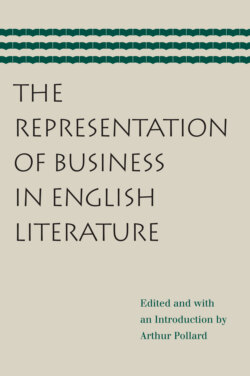The Representation of Business in English Literature

Реклама. ООО «ЛитРес», ИНН: 7719571260.
Оглавление
Группа авторов. The Representation of Business in English Literature
Contents
Note on the Liberty Fund Edition
Foreword JOHN BLUNDELL
The Authors
Introduction. ARTHUR POLLARD University of Hull
Eighteenth-Century Attitudes Towards Business. W. A. SPECK University of Leeds
REACTIONS TO THE NEW FISCAL-MILITARY STATE
CIVIC HUMANISM
DEBATE ON LUXURY: STANDARDS AND QUALITY
THE FINANCIAL REVOLUTION—BRIBERY AND CORRUPTION
DEFOE CHAMPIONS COMMERCE
A GENTRY OF WAR PROFITEERS?
WEALTH AND GREATNESS THE CAUSE OF CORRUPTION
LITERARY CONDEMNATION OF THE SLAVE TRADE
Early Nineteenth Century: Birmingham—“Something Direful in the Sound” GEOFFREY CARNALL University of Edinburgh. INTRODUCTION
WALTER SCOTT’S NOSTALGIA FOR THE OLD ORDER
WORDSWORTH’S DENIGRATION OF INDUSTRIAL DEVELOPMENT
BLAKE’S REVOLT AGAINST ECONOMIC EXPANSION
JANE AUSTEN’S APPROACH TO COMMERCE
SOUTHEY: ROBERT OWEN AND THE “INVISIBILITY” OF BUSINESS IN EARLY-NINETEENTH-CENTURY LITERATURE
EDMUND BURKE: TRADESMEN SHOULD NOT RULE THE STATE
CHARLES LAMB: HIS ARCHETYPAL TRADESMAN JUKE JUDKINS
WALTER SCOTT: THE QUAKER ENTREPRENEUR—A DEDICATED “IMPROVER”—AND THE DECLINE OF THE “OLD ORDER”
TRADESMEN AND MEN OF COMMERCE: ARITHMETIC THEIR COMMON CURRENCY
JOHN GALT’S MR. CAYENNE—ENTREPRENEUR AND BENEFACTOR
KEATS AND HAZLITT: MERCHANTS/BUSINESSMEN CONDEMNED—“ETHICALLY AMBIGUOUS . . . INTELLECTUALLY AND EMOTIONALLY STUNTING”
The High Victorian Period (1850-1900): “The Worship of Mammon” ANGUS EASSON University of Salford
INTRODUCTION
Nineteenth-Century Financial Institutions: Buildings and Appearance
Manchester—A “Shock” City
ENGLISH LITERATURE AND THE AGE OF BUSINESS
Dickens’s Little Dorrit: English Social Hierarchy and Business
SOCIAL DISTINCTIONS AMONG THE PROFESSIONS
Questions of Status and Class
Merdle and Melmotte: Dickens’s and Trollope’s “Financiers”
MONEY, RACE, CLASS AND MORALITY
“Captains of Industry”: The Modern Heroes
SOCIAL CLIMBING, MONEY, COMMERCE AND TRADE
H. G. Wells on Class in English Society
Wells’s Analysis of the History and Class System of England
BIBLIOGRAPHY. Primary
Secondary
The Early Twentieth Century: Uniformity, Drudgery and Economics. ALLAN SIMMONS St. Mary’s University College. INTRODUCTION
SURVEY OF THE LITERATURE OF THE AGE
Shaw
Bennett
Wells
BUSINESS AND TRADE IN HARDY, LAWRENCE, AND CONRAD
Hardy
Lawrence
Conrad
Mid-Late Twentieth Century: “An Unprecedented Moral Quagmire” JOHN MORRIS Brunel University. 1. THE SCENE IN THE 1930s
Images of Cultural Debasement
Stream of Consciousness
Business and Industry—Class Divisions
2. THE POST-WAR ERA: THE BUSINESS OF DEATH AND ITS AFTERMATH
War and Business
The American Connection
DIRGE
The Technology of Control Systems
The Angry Young Men—a World of Absurdity
3. THE SIXTIES AND BEYOND
The Role of Money: The “Mad” Christie Malry
The Attack on Thatcherism
The “Money-Conspiracy”
The Obscenity of “Serious Money”
CORMAN
BROWN
CORMAN
SMITH
CORMAN
DUCKETT
HACKWELL
4. FINAL THOUGHTS
Index of Fictional Characters
A
B
C
D
E
F
G
H
I
J
K
L
M
O
P
R
S
T
U
V
W
Z
Subject Index
A
B
C
D
E
F
G
H
I
J
K
L
M
N
O
P
Q
R
S
T
U
V
W
Y
Z
Notes. Foreword
Introduction
Eighteenth-Century Attitudes Towards Business
Early Nineteenth Century: Birmingham—“Something Direful in the Sound”
The High Victorian Period (1850-1900): “The Worship of Mammon”
The Early Twentieth Century: Uniformity, Drudgery and Economics
Mid-Late Twentieth Century: “An Unprecedented Moral Quagmire”
Отрывок из книги
Note on the Liberty Fund Edition
Foreword
.....
Is any sick? The MAN OF ROSS relieves,
Prescribes, attends the med’cine makes, and gives.
.....